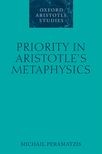 Priority in Aristotle's Metaphysics
Priority in Aristotle's Metaphysics
Contents
-
-
-
-
-
-
-
-
-
-
-
7.1 Biting the Bullet 7.1 Biting the Bullet
-
7.2 Pragmatic or Interest‐Relative Views 7.2 Pragmatic or Interest‐Relative Views
-
7.3 Two Objects – Two Definitions 7.3 Two Objects – Two Definitions
-
7.4 ‘Matter’ as an Ambiguous Term 7.4 ‘Matter’ as an Ambiguous Term
-
7.5 Proximate and Remote Types of Matter 7.5 Proximate and Remote Types of Matter
-
7.6 Reclaiming the Form's Priority over Matter: The Basics 7.6 Reclaiming the Form's Priority over Matter: The Basics
-
7.7 Definitional Models of Priority 7.7 Definitional Models of Priority
-
7.8 Determining the Prior and Posterior Relata: The Causal‐Explanatory Model Introduced 7.8 Determining the Prior and Posterior Relata: The Causal‐Explanatory Model Introduced
-
7.9 Filling in the Gaps: Specifying the Posterior Relata as Explananda 7.9 Filling in the Gaps: Specifying the Posterior Relata as Explananda
-
7.10 Conclusion: Dissecting the Definiens 7.10 Conclusion: Dissecting the Definiens
-
-
-
-
-
-
7 7 Essentially Enmattered Form as Prior to Matter: A Modest Proposal
Get access-
Published:August 2011
Cite
Abstract
Chapter 7 deals with the apparent conflict between the form’s essential enmatterment and its claim to essential and definitional priority over matter. The proposed solution is that, while form is not essentially independent of its own essential material parts, yet it could be prior to the material constituents of (particular or universal) compounds. Chapter 6 introduces what can be called Aristotle’s ‘causal‐explanatory’ model of essence. Aristotle lays out this model in Posterior Analytics B.8‐10, in his discussion of definitions of process‐kinds such as thunder or eclipse. In Metaphysics Z.17 and H.2‐4 Aristotle extends this causal‐explanatory model to cases of substance‐kinds. He holds that a substance‐kind is defined in terms of its type‐matter and the form which is its essence. His idea seems to be that the form or essence (e.g., being a rational soul) fixes the identity and is the cause of the type‐with‐type‐matter, the one which is identified with the substance‐kind defined (e.g., the human‐kind).
Sign in
Personal account
- Sign in with email/username & password
- Get email alerts
- Save searches
- Purchase content
- Activate your purchase/trial code
- Add your ORCID iD
Purchase
Our books are available by subscription or purchase to libraries and institutions.
Purchasing information| Month: | Total Views: |
|---|---|
| October 2022 | 6 |
| November 2022 | 1 |
| December 2022 | 2 |
| January 2023 | 3 |
| February 2023 | 3 |
| March 2023 | 5 |
| June 2023 | 1 |
| November 2023 | 2 |
| December 2023 | 2 |
| February 2024 | 1 |
| May 2024 | 3 |
| June 2024 | 1 |
| July 2024 | 1 |
| September 2024 | 1 |
| October 2024 | 1 |
| November 2024 | 3 |
| December 2024 | 6 |
| April 2025 | 4 |
Get help with access
Institutional access
Access to content on Oxford Academic is often provided through institutional subscriptions and purchases. If you are a member of an institution with an active account, you may be able to access content in one of the following ways:
IP based access
Typically, access is provided across an institutional network to a range of IP addresses. This authentication occurs automatically, and it is not possible to sign out of an IP authenticated account.
Sign in through your institution
Choose this option to get remote access when outside your institution. Shibboleth/Open Athens technology is used to provide single sign-on between your institution’s website and Oxford Academic.
If your institution is not listed or you cannot sign in to your institution’s website, please contact your librarian or administrator.
Sign in with a library card
Enter your library card number to sign in. If you cannot sign in, please contact your librarian.
Society Members
Society member access to a journal is achieved in one of the following ways:
Sign in through society site
Many societies offer single sign-on between the society website and Oxford Academic. If you see ‘Sign in through society site’ in the sign in pane within a journal:
If you do not have a society account or have forgotten your username or password, please contact your society.
Sign in using a personal account
Some societies use Oxford Academic personal accounts to provide access to their members. See below.
Personal account
A personal account can be used to get email alerts, save searches, purchase content, and activate subscriptions.
Some societies use Oxford Academic personal accounts to provide access to their members.
Viewing your signed in accounts
Click the account icon in the top right to:
Signed in but can't access content
Oxford Academic is home to a wide variety of products. The institutional subscription may not cover the content that you are trying to access. If you believe you should have access to that content, please contact your librarian.
Institutional account management
For librarians and administrators, your personal account also provides access to institutional account management. Here you will find options to view and activate subscriptions, manage institutional settings and access options, access usage statistics, and more.